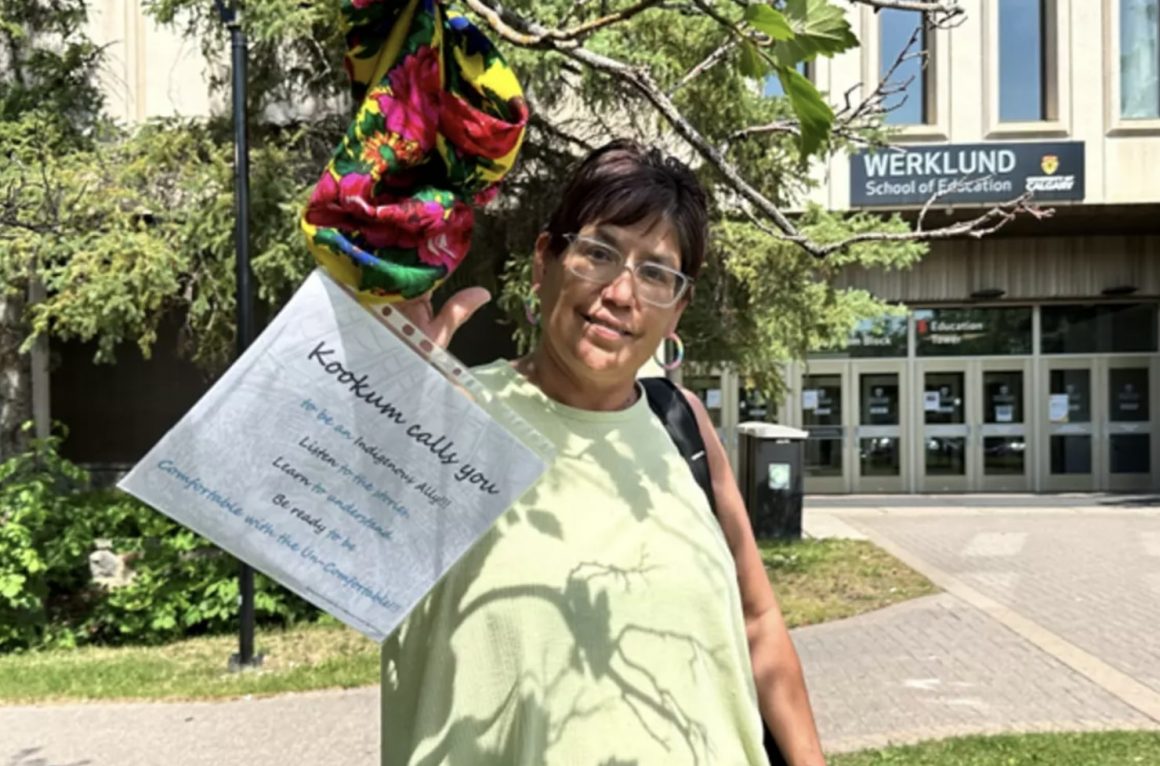
The ‘Kokum Calls You’ project: Empowering change through Indigenous wisdom
By Reyam Jamaleddine and Kimberly Taylor, October 27 2024—
For over a century, Indigenous children in Canada were forcibly removed from their homes and placed into residential schools. These residential schools were designed to erase and alter the identities, cultures and languages of Indigenous people. There were 140 residential schools that were federally operated between 1867 and 1996.
Each year as part of the Werklund School of Education masters students are invited to participate in a project to raise awareness around the Truth and Reconciliation Commission’s 94 calls to action. This year the Kokum Calls You project headed by Yvonne Poitras Pratt, Werklund School of Education professor and UCalgary Research Excellence Chair, Metis Nation of Alberta and blessed by Wanda First Rider, Kainai (Blackfoot) Elder hung scarves on trees around the education buildings.
Each scarf was accompanied by a poster made by one of the students participating in the project, but recent rain storms destroyed those posters. Students wrote about what actions they felt Kokum (Cree for grandmother) was calling them to take as part of reconciliation.
Poitras Pratt spoke with the Gauntlet about the origins of the project involving an Indigenous Elder, her masters students and other students who volunteered to take on various roles.
“I approached [Elder Wanda First Rider, Kainai] and I asked what she would think about using the Kokum scarves as a symbol of solidarity between Indigenous and non-Indigenous peoples,” said Pratt. “I wanted to really seek her wisdom and guidance around the symbolism. She said she thought that it was a beautiful way of expressing the need to work together in solidarity.”
The Kokum scarves hold deep significance within the indigenous community, they are typically vibrant and floral-patterned. They symbolize respect, resilience as well as the strength of the Elder women. “Kokum” in Cree is translated to “grandmother. They were given to the local Cree communities by early Ukrainian settlers as the two communities traded and worked together on the prairies and as explained by Poitras Pratt have become important symbols of Indigenous and non-Indigenous people working together to improve their communities.
“Oftentimes the respected Elders, the women in particular, are buried with the Kokum scarves because it really is such a powerful symbol. It is so well regarded in our community”
Poitras Pratt highlighted the importance of working with Elders in the work of reconciliation to give her strength and courage.
“With Wanda First Rider standing … beside me and giving her blessings, I feel brave enough to do this type of work because I know that it’s been sanctioned by our community.”
Holly Anghel, second year undergraduate in International Indigenous Studies, Metis, assisted with the creation of artwork and a website for the project. Anghel highlighted that personal responsibility for taking action toward reconciliation was central to the project.
“Kokum means grandmother, and grandmother is a figure that is honored and important in your life and the idea of Kokum calls you to do something, Kokum calls you to care for the land, Kokum calls you to educate yourself, Kokum calls you to listen and learn. That sense of responsibility that comes with not only [in] the title of the project, but also the symbolism of the scarf itself, ” Anghel said.
Manar Al-Asiri, Werklund student, spoke about her experience as a non-Indigenous person working on the project.
“The burden and the onus should not be on our Indigenous community to tell us to do something. We should be supporting them from the bottom up. Educating someone takes a lot of effort and is a vulnerable thing to do and we need to support those who are willing to educate.”
Artwork from the project will be placed throughout the education buildings in the coming weeks. Poitras Pratt said that if individuals would like to contribute their own calls to action they can send her an email.
Each Kokum scarf was accompanied by a poster from one of the participating students that shared what they felt Kokum was calling them to do. While the recent rain destroyed the posters, they can also be found online at the Kokum Calls You website.
This article is a part of our Voices section and does not necessarily reflect the views of the Gauntlet editorial board.
